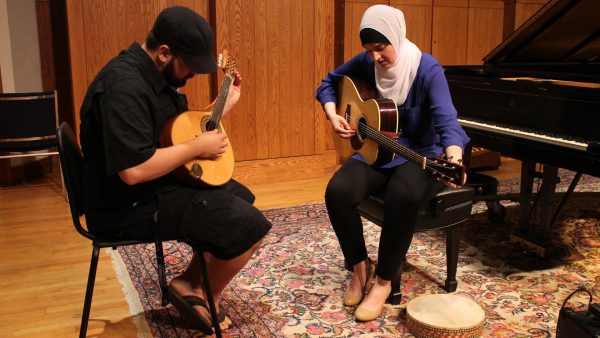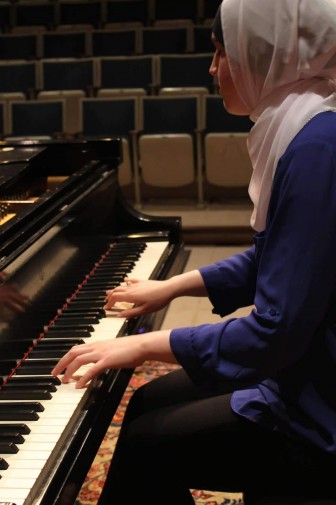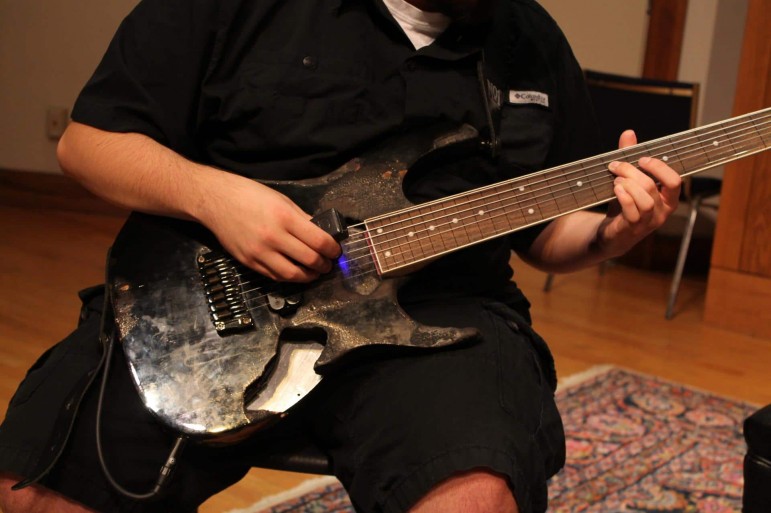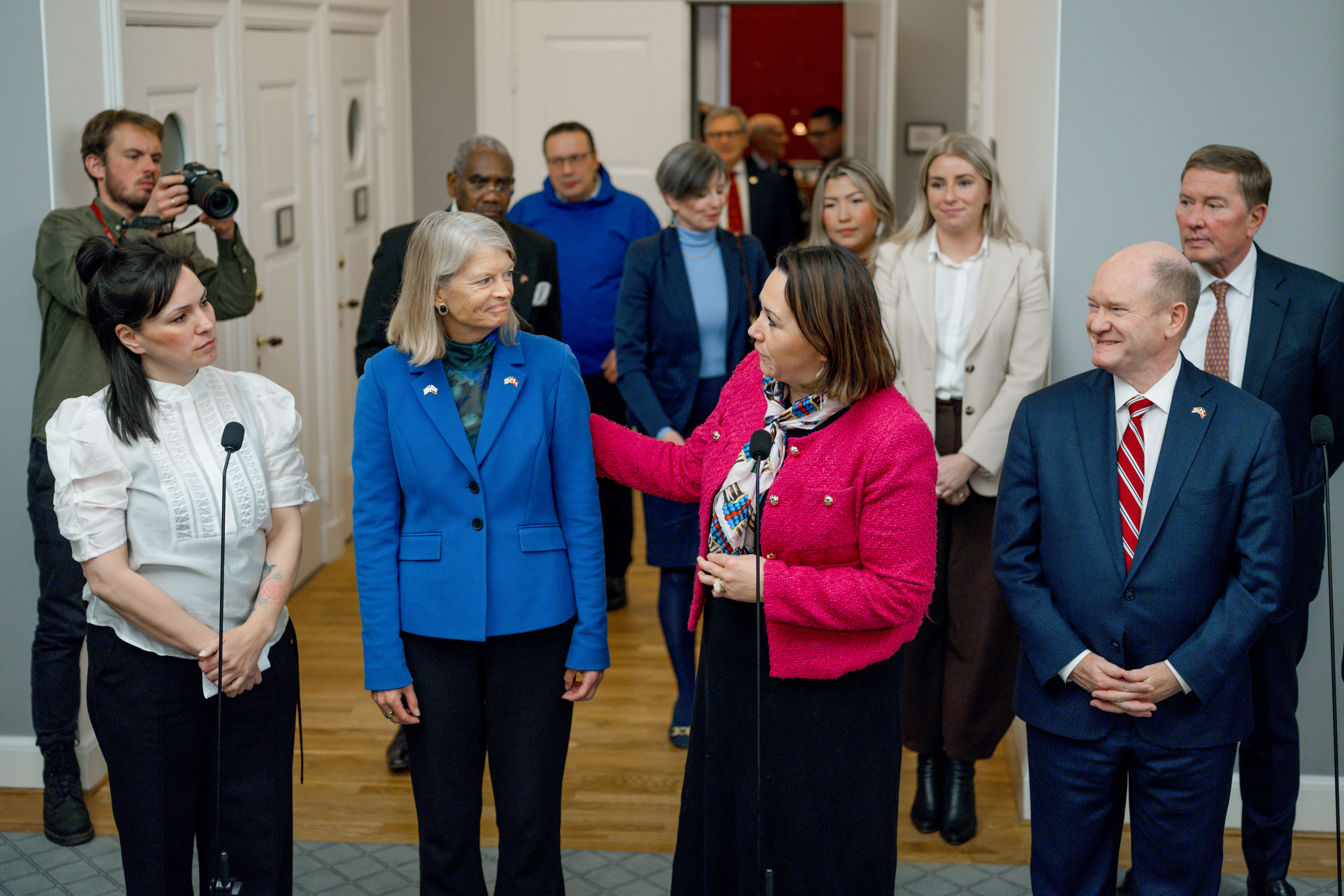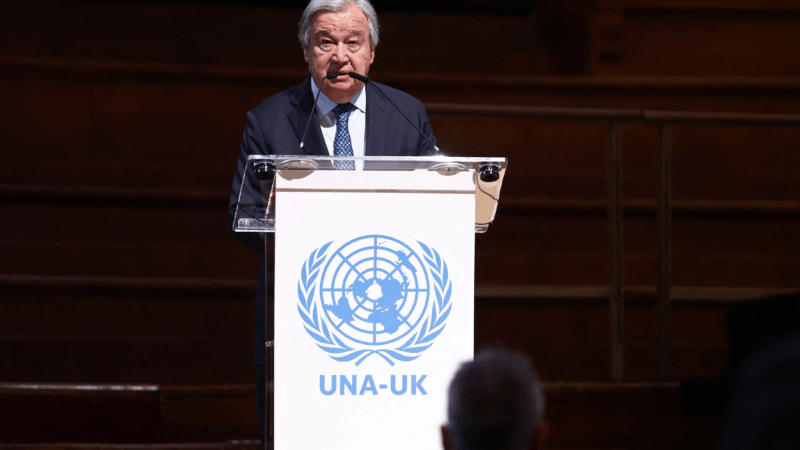“Resilience” is Theme to Documentary, Music about Syrian Refugee Camp
Dunya Habash and Thomas Woodham jam in the recital hall at Birmingham-Southern College. They co-wrote the score to Dunya's documentary, Za'atari: Jordan's Newest City, about a Syrian refugee camp turned thriving Middle-East community.
Dunya Habash was only 19 years old when she boarded a plane for Jordan in 2014, and her parents were not happy about it.
“When I first pitched this idea to my parents they said no, like you can’t go to Jordan. This is too dangerous, absolutely not,” she remembers.
But that didn’t stop her. She went to film a documentary, Za’atari: Jordan’s Newest City, about a Syrian refugee camp for her college honors project. At it’s peak, more than 200,000 displaced Syrians occupied Za’atari. It’s reported to be the second largest refugee camp in the world.
Dunya is Syrian-American and that helped her connect culturally with the people of Za’atari. Her parents are from Damascus, the capital. She wears a hijab, a traditional Muslim head covering. She speaks the language. But filming a documentary? That was a foreign experience. She spent months just teaching herself how to use a camera. But, the hardest part “was actually doing the interviews, and asking these people to just tell me the tragedy of their lives basically,” she says. “And I reminded myself that the point of what I’m doing is to be able to share their stories.”
But what Dunya found was not what most American’s probably imagine. Za’atari is a thriving community, which is why she calls it Jordan’s newest city, she says. Some people have opened businesses selling fresh meats and produce. There are hair salons and clothing boutiques. The Jordanian government has even run utilities like electricity to the camp. Many have married and started families.
“I just felt this feeling of resilience from the people,” Dunya recalls. “You know people were growing plants, building fountains inside their little homes and just really trying to resettle themselves.”
Dunya may have been a novice filmmaker, but she had a head start on one aspect of the production – the score. She studied music and co-wrote the film’s score with her music partner Thomas Woodham. Dunya plays piano, Thomas, a black, fire-damaged electric guitar that he destroyed himself. He and Dunya spent months crafting the perfect emotional soundscape to help tell the Za’atari story. At first, Thomas tried to write music before seeing any video footage. But he quickly realized he needed to see what he was writing for.
“I saw families and their children enjoying life,” Thomas says of the film clips Dunya sent him to examine. “And then on the flip side I saw tanks destroying buildings and new coverage that juxtaposition of beauty and family life and then violence and destruction.”
After that, the music wrote itself.
“I was able to say I think the soundtrack should consist of sweet melodies and ambiance and soft sounds that are easy to listen to. Along with some harsher sounds or more aggressive sounds,” Thomas says.
Just as the images influenced Thomas’s music, his compositions also helped Dunya get out of a creative rut on the film’s production side.
“It was amazing how much easier it was for me to put the visuals together once there was the foundation of the music.”
The film was released in March of this year and is available on YouTube. The two have also formed a group called Rooh, which from Arabic loosely translates to “soul.” They say their first album, Burning Silence, will hopefully be available soon.
Thomas has a couple of years left at Birmingham-Southern. Dunya is off to Oxford University in England in the fall to pursue a master’s degree in refugee studies. A decision, she says, was inspired entirely by the people she met in Za’atari.
Trump has rolled out many of the Project 2025 policies he once claimed ignorance about
Some of the 2025 policies that have been implemented include cracking down on immigration and dismantling the Department of Education.
U.S. lawmakers wrap reassurance tour in Denmark as tensions around Greenland grow
A bipartisan congressional delegation traveled to Denmark to try to deescalate rising tensions. Just as they were finishing, President Trump announced new tariffs on the country until it agrees to his plan of acquiring Greenland.
Can exercise and anti-inflammatories fend off aging? A study aims to find out
New research is underway to test whether a combination of high-intensity interval training and generic medicines can slow down aging and fend off age-related diseases. Here's how it might work.
The 2026 Olympics are the most widespread in history. See what’s happening where
Competitions will be hosted at 25 venues spanning an area of more than 8,000 square miles. Here's what's happening at each of the four main clusters.
High-speed trains collide after one derails in southern Spain, killing at least 21
The crash happened in Spain's Andalusia province. Officials fear the death toll may rise.
United Nations leaders bemoan global turmoil as the General Assembly turns 80
On Saturday, the UNGA celebrated its 80th birthday in London. Speakers including U.N. Secretary-General António Guterres addressed global uncertainty during the second term of President Trump.

